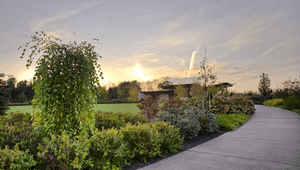The Arboretum at Penn State
| The Arboretum at Penn State | |
|---|---|
|
The H.O. Smith Botanical Gardens in the Arboretum at Penn State | |
| Location | |
| Location | Pennsylvania State University, University Park, Pennsylvania, United States |
| Size | 395 acres (1.60 km2) |
| Website | http://www.arboretum.psu.edu |
| Construction details | |
| Status | Complete |
The Arboretum at Penn State (395 acres), which contains the H.O. Smith Botanic Gardens, is a new arboretum being created by The Pennsylvania State University adjacent to its University Park campus in State College, Pennsylvania. It will become Penn State's second arboretum, joining the Arboretum at Penn State Behrend, which was created in 2003.
The arboretum's master plan was developed from 1996-1999 by Sasaki Associates. Specific plans for landscape and botanic gardens and their associated facilities were completed in 2002 by MTR Landscape Architects LLC, and the first tree, a white oak (Quercus alba) was dedicated in 2005. A donation of $10 million was needed to begin the construction of the Arboretum and on May 18, 2007, this donation was received from Charles H. "Skip" Smith. The construction of Phase I of the H.O. Smith Botanic Gardens, named in honor of Mr. Smith's father, was completed in fall 2009 and the gardens were officially dedicated on April 25, 2010.
In July 2014, the Arboretum finished construction of and opened the Childhood Gate's Children's Garden. It includes a limestone cave, stone amphitheater for events, and other attractions for children.[1] The Children's Garden has many native Pennsylvania plants and is a microcosm of the regional landscape.[2]
See also
| Wikimedia Commons has media related to Arboretum at Penn State. |
References
- ↑ Weigel, George (25 July 2014). "Penn State opens new children's garden: George Weigel". PennLive. PennLive\Patriot News. Retrieved 25 February 2015.
- ↑ "Gardens & Groves". http://arboretum.psu.edu. Retrieved 25 February 2015. External link in
|website=(help)
External links
Coordinates: 40°48′18″N 77°51′51″W / 40.805051°N 77.864088°W
